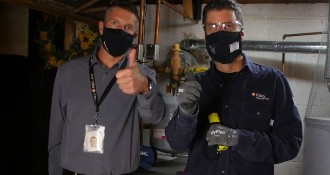Flood Safety
More Than Meets the Eye
Flood waters often conceal hazards that are not immediately obvious—and some of them can be deadly. Here's what you need to know.
Most people are already aware that water and electricity don't mix. Rising water can increase your exposure to other kinds of hazards, as well.

Know the Signs of an Overheating BoilerAn overheating boiler is a dangerous situation that could lead to injury and/or explosion. PSEG crews regularly train with local fire departments to maintain the safety of first responders and residents. Learn what to do if you suspect an overheating boiler.
|
If you notice water rising outside of your home or you are planning to evacuate your home ...
- Unplug all of your electrical appliances.
- Shut off the natural gas supply valve to any gas appliances. The valve is usually found on the gas line to the appliance. Do not attempt any further work until this has been done.
- If you plan to move natural gas appliances, the open end of the gas pipe must be capped or plugged to prevent the back flow of floodwater into the gas piping system. You can do this by using plugs or pipe caps that are available at hardware or plumbing-supply stores.
- Establish a backup power or temporary relocation plan if someone in your home is dependent on electric-powered medical equipment.
- Make sure you have instructions for how to reset your home security alarm system after power resumes.
If your home is flooding ...
- Remember that pools of water may become electrically charged. Appliances in standing water may also become charged, so do not touch them after they have become surrounded by water.
- If you can do so safely, turn off air conditioners or major appliances that may have been running when the outage occurred. This will help avoid a sudden surge of power when electric service is restored.
- Call PSE&G immediately at 1-800-880-7734 (PSEG) or 911 if you smell gas.
- Be careful walking on floors and stairs that have been covered with mud. They may be slippery. Hold the railing (if there is one) and step to the side of stairs as you go up and down.
- Don’t go into basements with standing water, raw sewage or obvious electric hazards. Stay away from the breaker box in a flooded basement.
- Watch out for animals and snakes that may have been flooded out of their homes and are seeking shelter.
If you must leave your home during a flood ...
- Remember that all downed power lines are dangerous and should be avoided. Stay at least 30 feet away from all downed wires and keep others from going near them as well. Log in to My Account or call 1-800-436-7734 or 911 immediately to report downed wires.
- Listen to the radio or television for storm recovery information.
- Do not walk or drive through moving water. Keep in mind that 18-24 inches of moving water is enough to sweep most vehicles away.
- If you're walking, use a pole or stick to make sure to check the depth of the water. Remember that flooding may have caused ground to collapse.
- Wear heavy duty shoes if you can and watch where you step. Flood water may carry debris such as broken bottles or nails.
- Drive with extra caution if traffic lights and railroad crossing signals are not operating.
- Don't drive around road barriers—roads or bridges may be washed out.
- If floodwaters rise around your car while you're in it, abandon the car and move to higher ground if you can do so safely.
- In the event that an electric line or wire comes down on your vehicle, stay in the vehicle until professional help arrives to safely remove you from the vehicle. Learn more about downed power line safety here.
After flood waters recede ...
- Pump out flooded basements gradually (about one-third of the water per day) to avoid structural damage.
- If the natural gas was shut off at the meter, do not try to turn it back on yourself.
- Some towns or municipalities may require an inspection prior to restoring gas or electric service. After water has been cleared from your home, contact your town/municipality to determine if an inspection is required.
- If the inspector finds damage to the electric facilities (electric panel, meter box), you must have a contractor make repairs.
- Following any electric repairs by your contractor, contact the town/municipality to obtain a re-inspection, if required.
- Once the home/building has passed inspection, please contact PSE&G to restore service.
- Be aware that appliances that have been exposed to water can short out and become a fire hazard. Replace them or have them inspected before attempting to use them.
- Boilers or water heaters exposed to water can damage the electronic control panel and overheat if attempted to be used. Signs of an overheated boiler include: boiler will not turn off, leaking steam, rumbling noise, burning smell, red glow, high pressure, or high/overheated temperature.
- Overheated boilers are extremely dangerous. If you identify one, evacuate your home immediately. Check out the Overheated Boiler Fact Sheet for more information on how to identify an overheated boiler and what to do next.





















